Bram Weijters : Interview with the piano player from Antwerp
We met each other just before the concert at the former chapel of the Poor Clares in Mechelen. Bram Weijters and his quartet took part in jazzathome 2016 a festival which exists since twelve years.
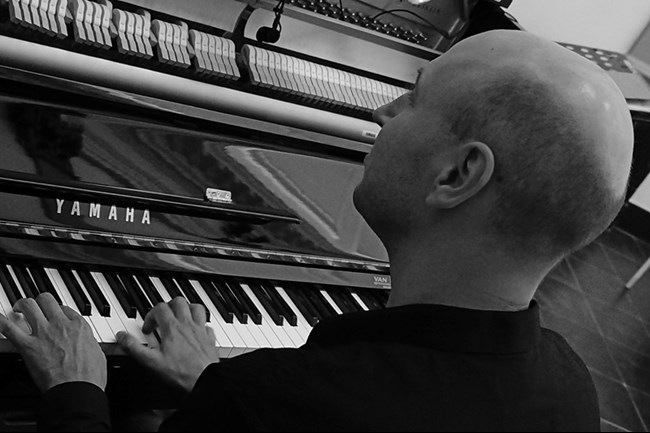
Why did you start with piano lessons at the age of eight?
BW: Why at the age of eight or why I started?
Both topics are of interest because a lot of musicians I have spoken with told me that they developed an interest in music in prep-school days already.
BW: Why I started to take piano lessons : I have two older brothers and they were both in music school. I didn’t ask too much questions and just decided to make music as well and I was fully supported to do that. It’s a bit funny but at that age I didn't have a clue of which instrument I wanted to play. I think I wanted to play synthesizers and electronic music. Somebody told me ‘yeah, practice some piano first then’. That's how I got into playing the piano. I only recently got into synthesizers, I completely forgot what I actually planned to do! (with a bit of laughing).
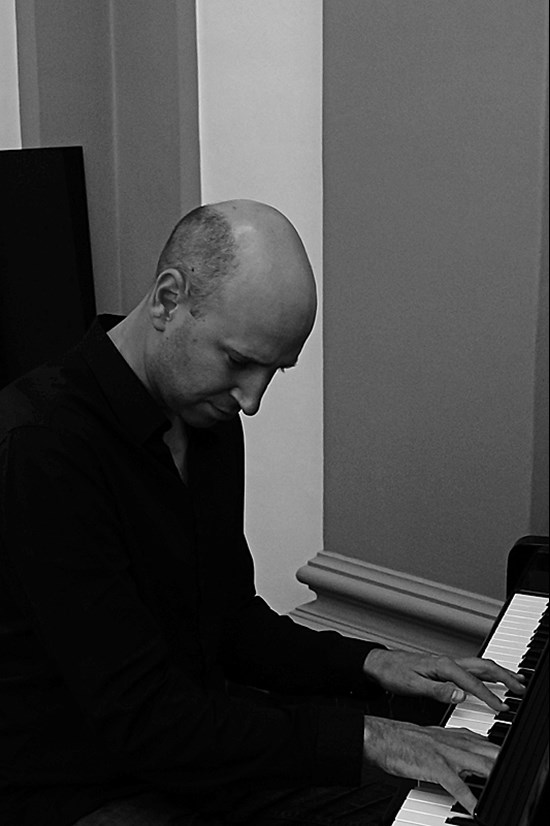
Why at the age of eight?
It is quite simple because music school started at that age. Now you can start at a younger age but back then it was just like that. I had to start with solfège for one year and then I could start to learn and play the piano.
When you started with those lessons did you focus on classical music or already Jazz?
BW: I didn't really have an idea what jazz was like. Back then – it changed completely now – the main focus in music school was on classical music. It was a classical training, pretty academic and technical. But it was really nice because I liked the music. Beside that I listened to some pop music of course. My father listened to traditional Jazz like New Orleans stuff, so I knew that jazz existed. And my two older brothers were busy with rock music. So my main influences when I was young were classical music and the rock music I heard at home. It was only until later that I got into jazz because I wanted to improvise. I was always improvising on the piano so people told me that I should check out jazz music because that's all about improvisation. But at that time there was nobody in my environment who was into modern jazz, there was nobody who could assist me in which direction to go. So I went to the local public library. They stocked a very fine Jazz collection of vinyl and CD’s. Randomly I picked some CD's. The first I picked was “Something else” by Cannonball Adderley, with Miles Davis. I fell in love with it right away. I was completely blown away especially by Miles Davis. I felt the magic and decided to keep searching music in that direction.
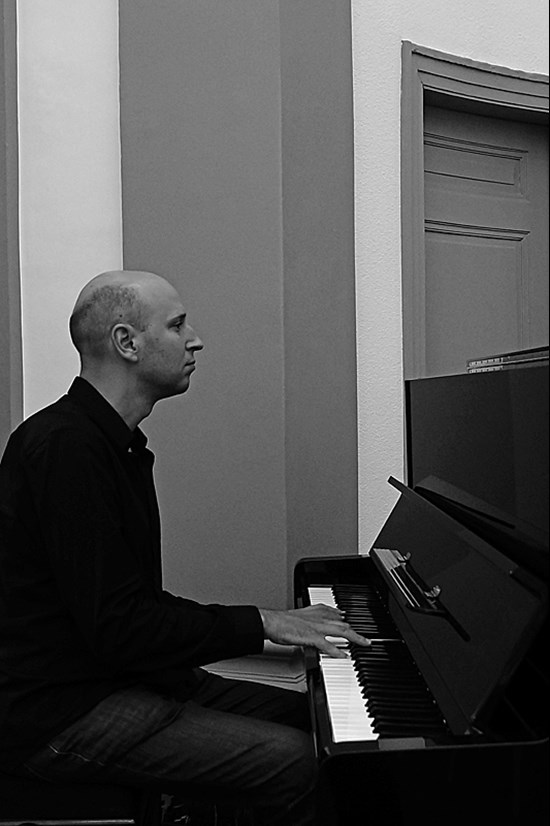
How important was the environment you grew up and raised for your dedication to music? Did your parents listen to a lot of music? Was music a sort of daily diet during your childhood and teenager years? How important is such an environment and the fact that parents are musicians themselves? Or is that neglectable and do you think that if you are dedicated to music and talented you can start a career as a professional musician.
BW: I think it is a bit of both. My parents didn't play music back then. My father only started recently! But my father was really interested in music and my parents were both supportive. So it was pretty easy for me to attend the music school. For me it was a kind of natural thing to do because my older brothers did it already. There was music around me. I grew up in a stable environment with lots of love. That makes everything in life easier. But on the other hand there weren’t any role models for getting into Jazz. I am 36 now, when I started to follow music lessons the internet wasn't available for searching jazz music in such extent as today and therefore I ended up in the local library. At the music school there also wasn't a jazz department then - later I was actually one of the first teachers there to start with jazz classes. My teachers assisted me but were just focused on another genre of music. My piano teacher was really into classical music. I used to play percussion as well, also classical music and popular music, no jazz. This was good in some respect because then I played a lot of rock and punk. That gave me a lot of inspiration.
Earlier you mentioned the album “Something else” by Adderley and Miles. The piano seems not the focal point of the music you've been attracted to. It is mainly brass!
BW: Oh, but here is piano involved. I think Hank Jones plays on the recordings!
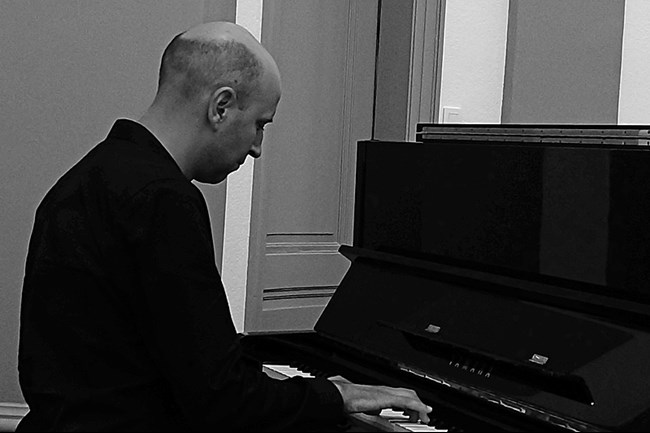
Okay, but what fascinated you so much? I should add that quite a number of musicians I interviewed so far mentioned Miles as the key figure at the start of their career. Many mentioned “Bitches Brew” or “Kind of blue” as albums they listened to. What is so special about Miles Davis?
BW: He's very special and the most important thing is his lyricism. It went straight to my heart, it was an emotional reaction. Afterwards it was curious to know what notes he was playing and what kind of chords and why it sounded like it did. Miles has an enormous impact, an emotional impact on me. That a lot of musicians say that his music is so influential is linked to the fact that Miles changed jazz history a couple of times. He changed the whole perspective. That's why he’s historically so important.
You played rock music as a teenager but gave it up later. Why? Did you ever dream of a career as a rock star?
BW: Maybe when I was a teenager I dreamt about it. (laughs) I never gave it up totally because I played alternative rock and pop music until a few years ago and even recently with Hamster axis of the one-click panther. We’ve played a lot with Mauro Pawlowski and he’s originally a rock musician, although he’s into a lot of free impro to. I am coming from the classical music and he is more rooted into rock. In the end you meet somewhere in between. Rock music never disappeared in my career but I am more interested in improvisation and flexibility. That’s why I don’t fit in a regular rock band. What I really like about rock bands and music is the raw energy.
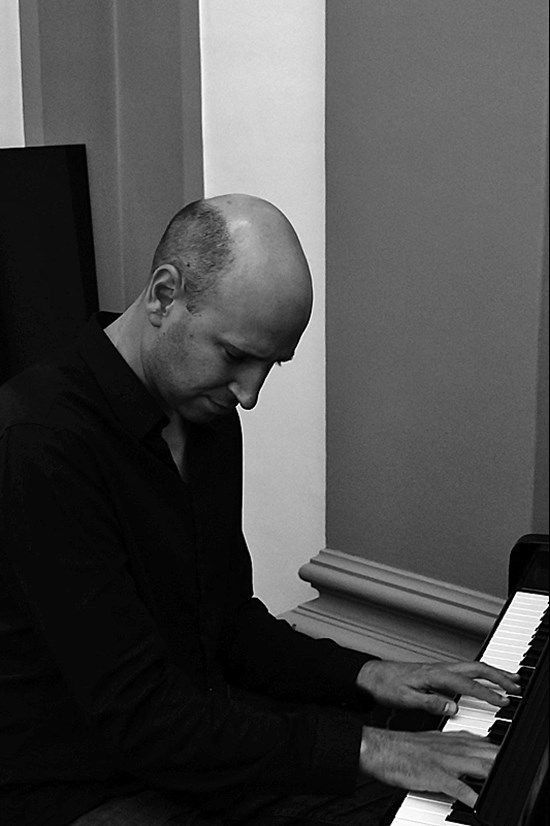
Do you remember the moment you thought about being a jazz piano player?
BW: There were different moments. There was definitely a click when I decided that I wanted to be a musician. That was the most important click. I thought “okay maybe I should study it”. At that time I played a lot of classical music and was into percussion as well. I was in doubt if I should go for classical percussion or for classical piano or jazz piano or jazz percussion. When I had to do my entrance exam in conservatory one of the teachers even tried to convince me to become a classical piano player. And that after all my hesitations and doubts! But by then it was clear for me that I wanted to play improvised music as well and to perform my own music, and not be playing something that somebody had written on paper.
How strong are your relations to jazz performed in the States considering that you play with the trumpetist Chad McCullough? Do you see differences between American and European Jazz musicians as far as their concepts are concerned?
BW: Well, first of all my personal connections with Chad are pretty strong: we played for years and recorded three albums, now we are working on a duo album and we toured a lot. It's the band I played the most concerts with.
Of course there are a lot of differences between the United States and Europe in general, but between the different states in their country are a lot of differences as well. I think Chad and I are very much focused on the same type of music so we are pretty close but of course there are still differences. Chad currently lives in Chicago. The scene there is very different to Seattle, where he used to live. And there’s also a different energy than in the jazz scene of New York.
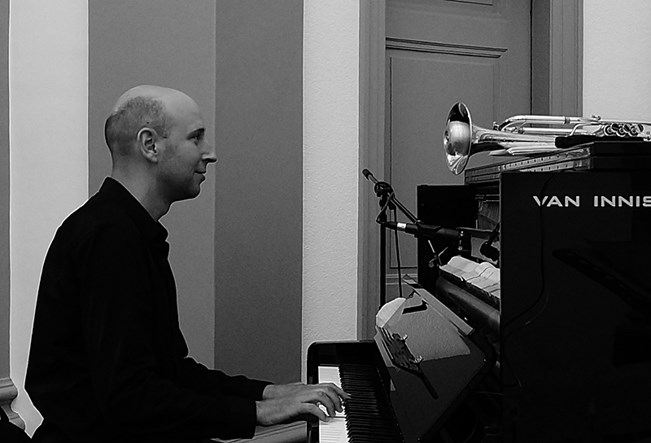
Would you say that European jazz has a very strong link to classical music? Some jazz musicians I know relate their compositions to Bartok or Messiaen. They later composed music which seems improvised music, what Messiaen denied but it sounds like it.
BW: Yeah, jazz is born in the United States and the tradition of jazz is coming from there. In contrast to the States there is this long history and tradition of classical music in Europe. There’s also a difference in classical music between Europe and the U.S.. A lot of New Music of the 1930s, 1940s and 1950s was composed by musicians who migrated from Europe to the States. In certain stages of history it was easier to get into new music in the States I think. They didn't have the weight of tradition. On the other hand: this tradition is so rich and that’s what you hear a lot in European music. If people are educated with a variety of classical music they will eventually incorporate this music in their own compositions.
Would you mind to describe the tunes you compose and play? Story telling, dramatic, very rhythmical, symphonious or melodious?
BW: Yes, I would describe them as ‘story telling’ but not in the way as program music. It's more about conversations. In some respect it is very traditional jazz with musicians playing their solos and trying to tell a story that the other musicians can relate to. In my music it’s about individual solos and old fashioned story telling, although there are of course lots of other possibilities as valuable as that.
And yes, I hope it’s rhythmical. It is probably more the way we play the music that makes it more rhythmical.
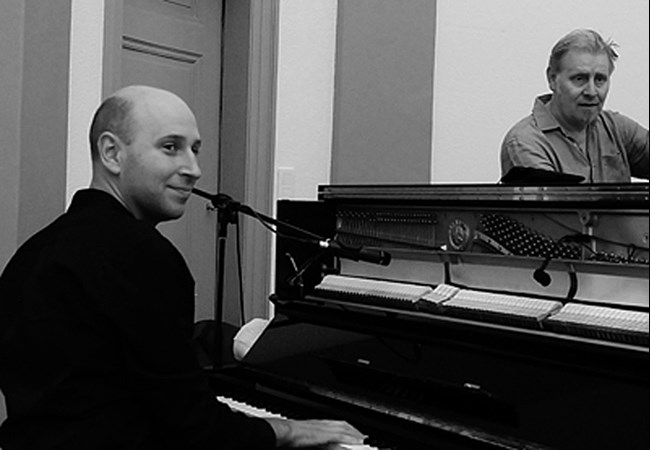
I regard your style of playing the piano as very rhythmical.
BW: No wonder, I have been a drummer for years! My playing has to do a lot with energy and rhythm and getting a groove together with the rhythm section.
You are a member of various bands like your own trio and your quartet with Chad McCullough but you play as well with Hamster axis of the one-click panther and with Piet Verbist's Zygomatik. If you compare the bands how would you characterize the variety of music involved.
BW: It's all starting from the same vision : playing music that is - to a certain extent - written out, but playing it in the moment and searching for the energy of the moment and searching to get everything together. The most important thing for all these bands is that all the different personalities blend together in the band. In that way you get a balance between composition, adventure and unexpected things happening, certain aesthetics of unity with some edges, not too clean and - for my taste - not to far out.
There are differences between the bands in reference to the played instruments. Performing with Zygomatik I play vintage keyboards: Fender Rhodes and Wurlitzer pianos. There are a lot of influences in Zygomatik’s music: soul and funk and whatever. It is more a 70’s Miles Davis vibe, but we don’t play it as a tribute to Miles: it is new music with newer things like odd meters. I also use a lot of effects on my keyboards.
My own quartet is more based on modern jazz. It is acoustic and we play from an acoustic point of view. The compositions and the playing is in that acoustic tradition. Hamster axis of the one-click panther is a bit more wild, it expresses raw energy and it is actually inspired by free jazz, but the early free jazz : Ornette Coleman and the early quartet of Keith Jarrett. Jarrett blended soul music with free Jazz back then. The music of Hamster axis of the one-click panther is less polished than my own quartet.
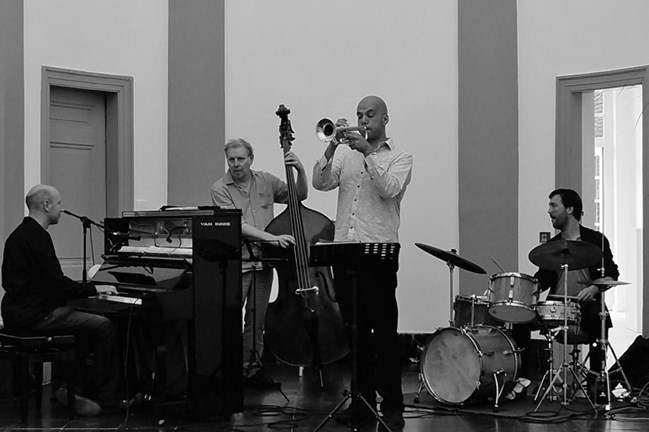
Thanks for talking to me.
Photos and Interview: © ferdinand dupuis-panther
Informations
Musician
Bram Weijters
http://www.bramweijters.com/
CD Reviews in German
http://www.jazzhalo.be/reviews/cd-reviews/b/bram-weijters-trio-at-studio-toots/
http://www.jazzhalo.be/reviews/cd-reviews/b/bram-weijters-chad-mccullough-quartet-imaginary-sketches/
http://www.jazzhalo.be/reviews/cd-reviews/b/bram-weijters-chad-mccullough-quartet-abstract-quantities-ferdinand-dupuis-panther/
CD Review in French
http://www.jazzhalo.be/reviews/cd-reviews/b/bram-weijters-chad-mccullough-quartet-abstract-quantities-claude-loxhay/
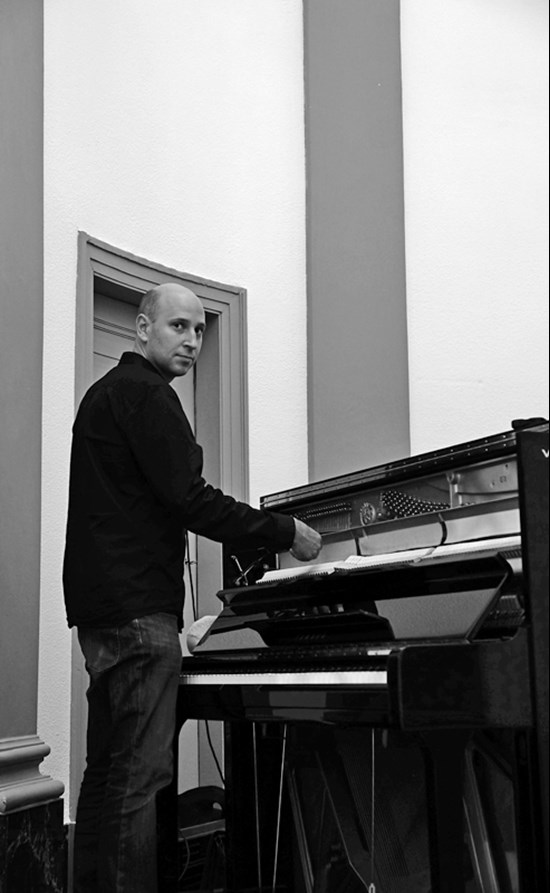
Other
In case you LIKE us, please click here:

Foto © Leentje Arnouts
"WAGON JAZZ"
cycle d’interviews réalisées
par Georges Tonla Briquet

our partners:



Hotel-Brasserie
Markt 2 - 8820 TORHOUT

Silvère Mansis
(10.9.1944 - 22.4.2018)
foto © Dirck Brysse

Rik Bevernage
(19.4.1954 - 6.3.2018)
foto © Stefe Jiroflée
Philippe Schoonbrood
(24.5.1957-30.5.2020)
foto © Dominique Houcmant

Claude Loxhay
(18/02/1947 – 02/11/2023)
foto © Marie Gilon

Pedro Soler
(08/06/1938 – 03/08/2024)
foto © Jacky Lepage
Special thanks to our photographers:
Petra Beckers
Ron Beenen
Annie Boedt
Klaas Boelen
Henning Bolte
Serge Braem
Cedric Craps
Luca A. d'Agostino
Christian Deblanc
Philippe De Cleen
Paul De Cloedt
Cindy De Kuyper
Koen Deleu
Ferdinand Dupuis-Panther
Anne Fishburn
Federico Garcia
Jeroen Goddemaer
Robert Hansenne
Serge Heimlich
Dominique Houcmant
Stefe Jiroflée
Herman Klaassen
Philippe Klein
Jos L. Knaepen
Tom Leentjes
Hugo Lefèvre
Jacky Lepage
Olivier Lestoquoit
Eric Malfait
Simas Martinonis
Nina Contini Melis
Anne Panther
France Paquay
Francesca Patella
Quentin Perot
Jean-Jacques Pussiau
Arnold Reyngoudt
Jean Schoubs
Willy Schuyten
Frank Tafuri
Jean-Pierre Tillaert
Tom Vanbesien
Jef Vandebroek
Geert Vandepoele
Guy Van de Poel
Cees van de Ven
Donata van de Ven
Harry van Kesteren
Geert Vanoverschelde
Roger Vantilt
Patrick Van Vlerken
Marie-Anne Ver Eecke
Karine Vergauwen
Frank Verlinden
Jan Vernieuwe
Anders Vranken
Didier Wagner
and to our writers:
Mischa Andriessen
Robin Arends
Marleen Arnouts
Werner Barth
José Bedeur
Henning Bolte
Erik Carrette
Danny De Bock
Denis Desassis
Pierre Dulieu
Ferdinand Dupuis-Panther
Federico Garcia
Paul Godderis
Stephen Godsall
Jean-Pierre Goffin
Claudy Jalet
Chris Joris
Bernard Lefèvre
Mathilde Löffler
Claude Loxhay
Ieva Pakalniškytė
Anne Panther
Etienne Payen
Quentin Perot
Jacques Prouvost
Renato Sclaunich
Yves « JB » Tassin
Herman te Loo
Eric Therer
Georges Tonla Briquet
Henri Vandenberghe
Peter Van De Vijvere
Iwein Van Malderen
Jan Van Stichel
Olivier Verhelst



